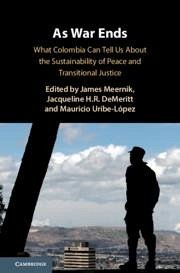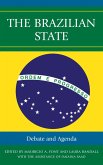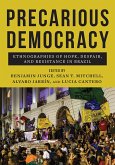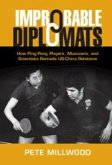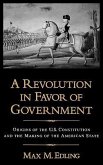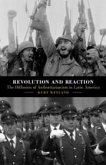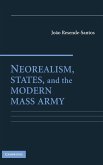As War Ends
What Colombia Can Tell Us about the Sustainability of Peace and Transitional Justice
Herausgeber: Meernik, James; Uribe-López, Mauricio; Demeritt, Jacqueline H R
As War Ends
What Colombia Can Tell Us about the Sustainability of Peace and Transitional Justice
Herausgeber: Meernik, James; Uribe-López, Mauricio; Demeritt, Jacqueline H R
- Gebundenes Buch
- Merkliste
- Auf die Merkliste
- Bewerten Bewerten
- Teilen
- Produkt teilen
- Produkterinnerung
- Produkterinnerung
A comprehensive and timely analysis of the prospects for peace and justice in Colombia.
Andere Kunden interessierten sich auch für
![Brazilian State Brazilian State]() Brazilian State170,99 €
Brazilian State170,99 €![Precarious Democracy Precarious Democracy]() Precarious Democracy158,99 €
Precarious Democracy158,99 €![After War Ends After War Ends]() Larry MayAfter War Ends80,99 €
Larry MayAfter War Ends80,99 €![Improbable Diplomats Improbable Diplomats]() Pete MillwoodImprobable Diplomats59,99 €
Pete MillwoodImprobable Diplomats59,99 €![A Revolution in Favor of Government A Revolution in Favor of Government]() Max M EdlingA Revolution in Favor of Government103,99 €
Max M EdlingA Revolution in Favor of Government103,99 €![Revolution and Reaction Revolution and Reaction]() Kurt WeylandRevolution and Reaction116,99 €
Kurt WeylandRevolution and Reaction116,99 €![Neorealism, States, and the Modern Mass Army Neorealism, States, and the Modern Mass Army]() Joao Resende-SantosNeorealism, States, and the Modern Mass Army89,99 €
Joao Resende-SantosNeorealism, States, and the Modern Mass Army89,99 €-
-
-
A comprehensive and timely analysis of the prospects for peace and justice in Colombia.
Hinweis: Dieser Artikel kann nur an eine deutsche Lieferadresse ausgeliefert werden.
Hinweis: Dieser Artikel kann nur an eine deutsche Lieferadresse ausgeliefert werden.
Produktdetails
- Produktdetails
- Verlag: Cambridge University Press
- Seitenzahl: 442
- Erscheinungstermin: 5. September 2019
- Englisch
- Abmessung: 160mm x 234mm x 23mm
- Gewicht: 816g
- ISBN-13: 9781108499040
- ISBN-10: 110849904X
- Artikelnr.: 55177970
- Herstellerkennzeichnung
- Libri GmbH
- Europaallee 1
- 36244 Bad Hersfeld
- gpsr@libri.de
- Verlag: Cambridge University Press
- Seitenzahl: 442
- Erscheinungstermin: 5. September 2019
- Englisch
- Abmessung: 160mm x 234mm x 23mm
- Gewicht: 816g
- ISBN-13: 9781108499040
- ISBN-10: 110849904X
- Artikelnr.: 55177970
- Herstellerkennzeichnung
- Libri GmbH
- Europaallee 1
- 36244 Bad Hersfeld
- gpsr@libri.de
Introduction James Meernik, Jacqueline Demeritt and Mauricio Uribe-Lopez;
1. The complexity of the organizational design for implementation of a
peace accord: a predictable obstacle to the Peace Agreement with the FARC?
Santiago Leyva and Pablo Correa; 2. Violence, grassroots pressure, and
Civil War peace processes: Insights from the Colombia-FARC conflict J.
Michael Greig ; 3. Land, violence, and the Colombian peace process
Jacqueline Demeritt, Amalia Pulido, David Mason and James Meernik; 4.
Determinants of state strength and capacity: understanding citizen
allegiance Juan Albarracín and Sarah Zukerman Daly; 5. The threat of
organized crime in post-conflict Colombia Gustavo Duncan and Camila Suárez;
6. Violence after peace Jennifer S. Holmes and Viveca Pavon-Harr; 7. Two
emblematic peace building initiatives in Antioquia: a comparative analysis
of peace infrastructures Mauricio Uribe-López and Valeria Correa-Barrera;
8. From counterinsurgency to peacebuilding: addressing barriers to lasting
peace in Colombia Oliver Kaplan and Joseph Young; 9. Transitional justice
in the Colombian final accord: text, context, and implementation Jason
Quinn and Madhav Joshi; 10. The comprehensive system of truth, justice,
reparation, and non-repetition: precedents and prospects Onur Bakiner; 11.
Una tierra inexplorada: gendering the peace process in Colombia Jacqueline
Demeritt and Kimi King; 12. Leading the public to peace: trust in elites,
the legitimacy of negotiated peace, and support for transitional justice
Ryan E. Carlin, Jennifer L. McCoy and Jelena Suboti; 13. Securing the peace
and promoting human rights in post-accord Colombia: the role of
restorative, reparative, and transformative justice dimensions Rebekka
Friedman, Nelson Camilo Sánchez and Eric Wiebelhaus-Brahm; 14. Achieving an
unpopular balance: post-conflict justice and amnesties in comparative
perspective Geoff Dancy; 15. Countering violent extremism through narrative
intervention: for a decentering of the local turn in peacebuilding Carlo
Tognato; 16. Geographies of truth in the Colombian transitional justice
process Adriana Valderrama, Melina Ocampo, Fernando Hoyos, Mariluz
Gonzalez, David Rincon, Edison Vargas and Maria Cristina Paton; Conclusion
James Meernik, Jacqueline Demeritt and Mauricio Uribe.
1. The complexity of the organizational design for implementation of a
peace accord: a predictable obstacle to the Peace Agreement with the FARC?
Santiago Leyva and Pablo Correa; 2. Violence, grassroots pressure, and
Civil War peace processes: Insights from the Colombia-FARC conflict J.
Michael Greig ; 3. Land, violence, and the Colombian peace process
Jacqueline Demeritt, Amalia Pulido, David Mason and James Meernik; 4.
Determinants of state strength and capacity: understanding citizen
allegiance Juan Albarracín and Sarah Zukerman Daly; 5. The threat of
organized crime in post-conflict Colombia Gustavo Duncan and Camila Suárez;
6. Violence after peace Jennifer S. Holmes and Viveca Pavon-Harr; 7. Two
emblematic peace building initiatives in Antioquia: a comparative analysis
of peace infrastructures Mauricio Uribe-López and Valeria Correa-Barrera;
8. From counterinsurgency to peacebuilding: addressing barriers to lasting
peace in Colombia Oliver Kaplan and Joseph Young; 9. Transitional justice
in the Colombian final accord: text, context, and implementation Jason
Quinn and Madhav Joshi; 10. The comprehensive system of truth, justice,
reparation, and non-repetition: precedents and prospects Onur Bakiner; 11.
Una tierra inexplorada: gendering the peace process in Colombia Jacqueline
Demeritt and Kimi King; 12. Leading the public to peace: trust in elites,
the legitimacy of negotiated peace, and support for transitional justice
Ryan E. Carlin, Jennifer L. McCoy and Jelena Suboti; 13. Securing the peace
and promoting human rights in post-accord Colombia: the role of
restorative, reparative, and transformative justice dimensions Rebekka
Friedman, Nelson Camilo Sánchez and Eric Wiebelhaus-Brahm; 14. Achieving an
unpopular balance: post-conflict justice and amnesties in comparative
perspective Geoff Dancy; 15. Countering violent extremism through narrative
intervention: for a decentering of the local turn in peacebuilding Carlo
Tognato; 16. Geographies of truth in the Colombian transitional justice
process Adriana Valderrama, Melina Ocampo, Fernando Hoyos, Mariluz
Gonzalez, David Rincon, Edison Vargas and Maria Cristina Paton; Conclusion
James Meernik, Jacqueline Demeritt and Mauricio Uribe.
Introduction James Meernik, Jacqueline Demeritt and Mauricio Uribe-Lopez;
1. The complexity of the organizational design for implementation of a
peace accord: a predictable obstacle to the Peace Agreement with the FARC?
Santiago Leyva and Pablo Correa; 2. Violence, grassroots pressure, and
Civil War peace processes: Insights from the Colombia-FARC conflict J.
Michael Greig ; 3. Land, violence, and the Colombian peace process
Jacqueline Demeritt, Amalia Pulido, David Mason and James Meernik; 4.
Determinants of state strength and capacity: understanding citizen
allegiance Juan Albarracín and Sarah Zukerman Daly; 5. The threat of
organized crime in post-conflict Colombia Gustavo Duncan and Camila Suárez;
6. Violence after peace Jennifer S. Holmes and Viveca Pavon-Harr; 7. Two
emblematic peace building initiatives in Antioquia: a comparative analysis
of peace infrastructures Mauricio Uribe-López and Valeria Correa-Barrera;
8. From counterinsurgency to peacebuilding: addressing barriers to lasting
peace in Colombia Oliver Kaplan and Joseph Young; 9. Transitional justice
in the Colombian final accord: text, context, and implementation Jason
Quinn and Madhav Joshi; 10. The comprehensive system of truth, justice,
reparation, and non-repetition: precedents and prospects Onur Bakiner; 11.
Una tierra inexplorada: gendering the peace process in Colombia Jacqueline
Demeritt and Kimi King; 12. Leading the public to peace: trust in elites,
the legitimacy of negotiated peace, and support for transitional justice
Ryan E. Carlin, Jennifer L. McCoy and Jelena Suboti; 13. Securing the peace
and promoting human rights in post-accord Colombia: the role of
restorative, reparative, and transformative justice dimensions Rebekka
Friedman, Nelson Camilo Sánchez and Eric Wiebelhaus-Brahm; 14. Achieving an
unpopular balance: post-conflict justice and amnesties in comparative
perspective Geoff Dancy; 15. Countering violent extremism through narrative
intervention: for a decentering of the local turn in peacebuilding Carlo
Tognato; 16. Geographies of truth in the Colombian transitional justice
process Adriana Valderrama, Melina Ocampo, Fernando Hoyos, Mariluz
Gonzalez, David Rincon, Edison Vargas and Maria Cristina Paton; Conclusion
James Meernik, Jacqueline Demeritt and Mauricio Uribe.
1. The complexity of the organizational design for implementation of a
peace accord: a predictable obstacle to the Peace Agreement with the FARC?
Santiago Leyva and Pablo Correa; 2. Violence, grassroots pressure, and
Civil War peace processes: Insights from the Colombia-FARC conflict J.
Michael Greig ; 3. Land, violence, and the Colombian peace process
Jacqueline Demeritt, Amalia Pulido, David Mason and James Meernik; 4.
Determinants of state strength and capacity: understanding citizen
allegiance Juan Albarracín and Sarah Zukerman Daly; 5. The threat of
organized crime in post-conflict Colombia Gustavo Duncan and Camila Suárez;
6. Violence after peace Jennifer S. Holmes and Viveca Pavon-Harr; 7. Two
emblematic peace building initiatives in Antioquia: a comparative analysis
of peace infrastructures Mauricio Uribe-López and Valeria Correa-Barrera;
8. From counterinsurgency to peacebuilding: addressing barriers to lasting
peace in Colombia Oliver Kaplan and Joseph Young; 9. Transitional justice
in the Colombian final accord: text, context, and implementation Jason
Quinn and Madhav Joshi; 10. The comprehensive system of truth, justice,
reparation, and non-repetition: precedents and prospects Onur Bakiner; 11.
Una tierra inexplorada: gendering the peace process in Colombia Jacqueline
Demeritt and Kimi King; 12. Leading the public to peace: trust in elites,
the legitimacy of negotiated peace, and support for transitional justice
Ryan E. Carlin, Jennifer L. McCoy and Jelena Suboti; 13. Securing the peace
and promoting human rights in post-accord Colombia: the role of
restorative, reparative, and transformative justice dimensions Rebekka
Friedman, Nelson Camilo Sánchez and Eric Wiebelhaus-Brahm; 14. Achieving an
unpopular balance: post-conflict justice and amnesties in comparative
perspective Geoff Dancy; 15. Countering violent extremism through narrative
intervention: for a decentering of the local turn in peacebuilding Carlo
Tognato; 16. Geographies of truth in the Colombian transitional justice
process Adriana Valderrama, Melina Ocampo, Fernando Hoyos, Mariluz
Gonzalez, David Rincon, Edison Vargas and Maria Cristina Paton; Conclusion
James Meernik, Jacqueline Demeritt and Mauricio Uribe.

